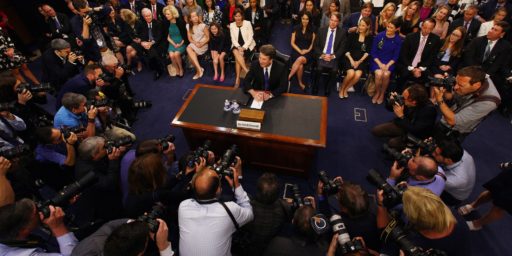Democrats Have Shot at Winning Senate
While still a longshot, some stumbles by favored Republicans and surprisingly strong showings by some underdogs are making Democrats optimistic about their chances of winning back the Senate.
Six weeks before Election Day, the Democrats suddenly face a map with unexpected opportunities in their battle for control of the Senate.
In Virginia, a state that few expected to be seriously competitive, Senator George Allen looks newly vulnerable after a series of controversies over charges of racial insensitivity, strategists in both parties say. In Tennessee, another Southern state long considered safely red, Representative Harold E. Ford Jr., a Democrat, has run a strong campaign that has kept that state in contention.
Elsewhere, Democratic challengers are either ahead or close in races in five states held by the Republicans: Missouri, Montana, Ohio, Pennsylvania and Rhode Island, according to political strategists in both parties and the latest polls.
All of these races could shift direction in a matter of days, let alone six weeks, and Republicans are counting on their superior finances and large blocks of television advertising to hold the line. Democrats also have their own vulnerabilities, particularly in New Jersey, where Senator Robert Menendez is in a tight race with his Republican challenger, State Senator Thomas H. Kean Jr., according to recent polls.
Democrats must win six Republican seats to regain a Senate majority, meaning they would have to win nearly every close race. Even the most optimistic Democrats acknowledge that such a feat would require a big anti-Republican wave, a lot of money and a lot of luck. Still, a shift in the Senate was always considered a long shot this year. Some analysts now say, however, that there are enough Republican seats facing serious challenges to make it at least plausible.
Despite his setbacks, I believe Allen will ultimately win re-election, even though his presidential bid is toast. As attractive a candidate as Harold Ford is, I don’t see him winning Tennessee when all’s said and done (although Tennessean Glenn Reynolds thinks it’s his race to lose at this point). Further complicating the Democratic calculus is that Republican incumbents once considered sure-fire losers, notably Rick Santorum, are back in the game.
Still, given the position from which the GOP is starting–a commanding lead in the Senate, a comfortable one in the House, a second term president, and an ongoing war–it’s remarkable that they’ve put themselves in a position where losing is quite possible. They’ve squandered, in less than two years, the considerable good will they had coming out of the last presidential election.





Y’know, there are so many moving parts in this equation I think it’s nuts (and a waste of brainpower) to even try to predict who’s going to be running things in a few months. Better (for either party) to just focus on winning wherever they can and worry about the big picture after that.
The election is less than 5 weeks away….
Legion,
I agree that there are a lot of moving parts, but I disagree that looking at who will be running things is “nuts”. I agree that things are close enough that neither party should be looking at plans for re-decorating the majority leaders office. But who will be running things is a key part of this election. One big asset the GOP has with swing voters is to have them look beyond the individual candidate and see what might happen under a democrat. I think even you would agree that the house would be very different under a speaker Pelosi, no matter that the vote that puts the gavel in her hand might be from a moderate democrat in a swing district.
Of course the downside to this argument is the same for the democrats. It isn’t arguing why your party should being charge, but that you aren’t the other party. Even so, it is a reasonable counter when the democrats are mostly running on a platform of “we aren’t republicans”.
The election is less than 5 weeks away….
Ah yes, but how long until the winners are in-place and actually operating? Before you make assumptions on that date, take another look at the fiasco of MD’s recent primary elections…
And as for who will be running things, even _that_ is still well up in the air, considering the number of senior GOP incumbents in risky positions right now, as well as general dissatisfaction with Frist’s leadership. If the Dems win, yeah Pelosi’s in charge, but if not, there’s little to predict with…
legion,
First, there is a big difference in the power of speaker and senate majority leader. So pointing to uncertainty about a replacement due to Frist retiring and Pelosi being speaker misses the point.
Second, while it is certainly tinted by my partisan ship, I have a hard time thinking of anyone who is likely to replace Frist (it won’t be a freshman elected this year, it won’t be Chaffee, etc) as being someone I would have a harder time living with than Pelosi for speaker. There are several likely names on the democratic senate side who I think would be worse than any of the GOP likely candidates. Likewise on the GOP side in the house, even if Hastert wasn’t going to be the likely next speaker, I would have a hard time thinking of a GOP rep who I would not prefer over Pelosi.
I understand if you think cutting and running from Iraq would only have a positive impact and no negative impacts why a speaker Pelosi wouldn’t fill you with dread. But if you can see some real potential for some real nasty negative side effects then you can see why such an outcome makes sense to consider before the election.
Maybe their unity around the enthusiastic support of torture and the denial of habeas corpus will salvage their fortunes.